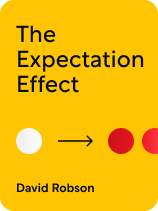

This article is an excerpt from the Shortform book guide to "The Expectation Effect" by David Robson. Shortform has the world's best summaries and analyses of books you should be reading.
Like this article? Sign up for a free trial here.
Have you been feeling unlike yourself? How can you improve your well-being?
According to The Expectation Effect by David Robson, expectation effects influence your mental and emotional health. It can get so bad that sleep, self-control, and the way you respond to stress are negatively affected.
Learn how to improve your well-being and change your lifestyle for the better.
1. Stress Response
Expectation effects play a role in our response to many feelings, including stress. Robson thinks stress may hurt us not because it’s inherently harmful but because we believe it’s bad for us. This means that we experience negative physiological effects from stress when we encounter it because we expect them.
(Shortform note: Some experts agree with Robson that we can think of stress as neutral. In Spark, psychiatrist John Ratey defines stress as any stimulus that initiates activity at the level of our cells. In this view, stress isn’t inherently good or bad, but a fundamental biological process. Ratey thinks that it’s when the body can’t keep up with the effects of the stress that we feel negative effects from it.)
To learn how to improve your well-being and your response to stress, try the following tactics:
Accept That You’re Feeling Stressed
First, Robson points out that by trying not to experience an unpleasant feeling like stress, you can create a nocebo effect out of a normal emotional experience. Instead, cultivate an attitude of acceptance toward stress. (Shortform note: Accepting negative feelings is an important step in many frameworks for changing your mindset. In Untamed, Glennon Doyle writes that embracing strong emotions and looking at them with curiosity rather than avoiding them enables you to learn something new from them.)
Put the Physical Symptoms Into Perspective
Next, Robson recommends reframing the physical effects of stress (like an elevated heart rate or a sense of jitters) as cues that your body is doing everything it needs to do. By letting your body respond to the stress, you can focus on the mental tasks at hand.
(Shortform note: Whether you can use the physical symptoms of your anxiety to help your focus likely depends on the severity of those symptoms. Anxiety before an exam can prompt you to study more and perform better, but symptoms like an increased heart rate, hyperventilation, or gastrointestinal issues can sidetrack you. With minor symptoms, experts recommend distracting yourself, trying breathing or relaxation exercises, and remembering that your symptoms will pass.)
Choose a Different Word for “Stress”
When the situation is right, try changing the words you use for your stress or anxiety. The physical experience of “anxiety” is similar to that of “excitement”: If you can find a positive label for what you’re feeling, you can respond more productively to the sensation. (Shortform note: Experts say that anxiety and excitement are different emotions, but that you can learn to turn your anxiety into excitement with the right strategy. To do this, think about the situation and why you should feel excited instead of anxious. Tell yourself that you feel excited, focus on your optimism, and channel your energy into productive action.)
2. Insomnia
Just as an expectation effect worsens our experience with stress via a negative psychological response, a similarly negative response makes insomnia worse than it needs to be, according to Robson. When we lie awake at night, wishing we were asleep, we fall into ruminative patterns of thought that keep us awake longer. Worrying about sleep causes more sleep loss, and experts think that worrying about not getting enough sleep is worse for your health than actually getting inadequate sleep.
(Shortform note: Psychologists identify rumination as a major cause of insomnia. This kind of thinking keeps your brain alert, and it’s hard to switch off. But two methods of reducing rumination seem to work: Set aside 15 minutes of your day to think through your worries. Or, practice “constructive worrying,” in which you find actionable steps to address your worries so you can feel like you have a plan.)
To cultivate a healthier attitude toward sleep, you can keep a couple of strategies in mind:
Gather Objective Data on Your Sleep
First, Robson recommends that if you think you’re not sleeping well, use a device or app to gather data. Because expectation effects exert a powerful influence over how rested we feel, it can help to have an objective view of how much and how well you’re sleeping.
(Shortform note: Experts say that sleep-tracking apps don’t offer objectively accurate sleep data analysis. But because they do enable you to watch for patterns over time, they can still help you improve your sleep. If you’re looking for clues to how you’re sleeping and how you could sleep better, apps are an inexpensive and accessible way to track how much and how well you’re sleeping, set goals for how much you’d like to sleep, and get advice on how to reach your sleep goals.)
Don’t Stress About Sleeplessness
Next, when you find yourself lying awake at night, accept that you’re feeling restless without worrying about how the loss of sleep might affect you in the morning. (Shortform note: Accepting sleeplessness isn’t easy, but in Why We Sleep, Matthew Walker offers some strategies you can try. He recommends against keeping a clock near your bed since you might watch the clock and get anxious. You can also get out of bed and only return when you feel sleepy, or try to confront any thoughts that are making you anxious before you go to bed.)
3. Limits of Self-Control and Mental Focus
Expectation effects also curtail your mental ability. Robson explains that we tend to assume that we have a limited amount of self-control and mental focus, but research shows that we place these limitations on ourselves. Whether you believe that your mental resources are limited or unlimited matters: The power of this belief means that expecting mental effort to feel energizing or anticipating that you can improve your concentration with effort can make these things true.
(Shortform note: Experts think that our motivation—including self-control and focus—is subjective and can improve with practice. Atomic Habits author James Clear explains that to concentrate on accomplishing a task, you need to ignore a lot of other things. He thinks that our struggles with mental focus come from a lack of clarity about priorities. So he advises that measuring what you get done can help you maintain your focus, and focusing on the process can help you exercise the self-control and focus needed to get your most important tasks done.)
To increase your willpower and mental focus, Robson recommends these steps:
Create Your Own Rituals
First, Robson recommends building rituals—like a routine of stretches to complete or a mantra to repeat—that help you feel in control of your self-control and concentration. These practices can boost your confidence in your ability, which may be all you need. (Shortform note: Several experts say that rituals can help you focus. In Deep Work, Cal Newport advises that you ritualize deep work, the kind of cognitively taxing work that requires intense concentration. One way to do this is to schedule time for these tasks, which can signal to your brain that it’s time to focus and put aside distractions. Newport also recommends creating an environment that you use specifically for deep work as another way to build rituals for yourself.)
Expect Your Skills to Improve
Next, adopt the view that willpower and focus are skills that you can practice and improve. In cultures where such attitudes are prevalent, people can improve these skills with effort. (Shortform note: Finding something interesting about the work you need to focus on might help you stay on task. Experts say that because positive expectations increase levels of dopamine in the brain, we’re better able to focus when we’re interested in a task or motivated to get it done.)
Remember Past Successes
Finally, reappraise your ability to exercise self-control and maintain your concentration by recalling a time when you were energized by mental effort. Robson explains that remembering how it felt to be absorbed in a task can help you exercise and improve these skills. (Shortform note: Recalling past successes could not only reinforce that you’re capable of difficult tasks but might also help counter the effects of stress—and tasks that test your focus or willpower can be stressful. Researchers find that recalling positive memories is an effective strategy for coping with stress and can improve your mood and make you feel more resilient.)
4. Intelligence and Creativity
Finally, expectation effects also influence the quality of the intelligence or creativity you can bring to a specific task. Robson points out that your expectations about your abilities often come from people around you. When you face a challenging task and think you are (or aren’t) up to the task, your expectations will likely come true. Memory, problem-solving, intellectual stamina, and resilience are influenced by what we believe about ourselves.
(Shortform note: Many experts say that intelligence isn’t fixed. In Make It Stick, Peter C. Brown, Henry Roediger III, and Mark A. McDaniel explain that one way you can increase your abilities is by adopting a “growth mindset,” acknowledging that it takes effort and discipline to learn.)
To let go of expectations that limit your intellectual performance, apply these strategies:
Take an Objective Look at Your Skills
First, Robson recommends that you assess your intellectual skills and your creativity as objectively as possible. You might feel out of your depth in a specific task, but that might be a result of expectations more than evidence. (Shortform note: Researchers say that underconfidence can motivate you to work harder but can also prevent you from even trying if you assume that other people are more skilled or better qualified than you. Getting a more objective view of how you compare to others can help you feel more confident in your skills.)
Recognize Frustration as Something Useful
Next, when you’re learning something new or practicing a difficult skill, reframe frustration as a sign that you’re learning so that you can reallocate mental resources to learning and improving.
(Shortform note: Experts say that making mistakes and experiencing frustration are key parts of learning. Some even think that to take full advantage of the plasticity of your brain, you have to make mistakes. Mistakes signal to your brain that something needs to change, and its response makes it possible for you to channel your frustration and make new connections.)
Try Self-Affirmation
Finally, Robson recommends that when you’re feeling anxious about how you’re perceived or feel that you’re at risk of conforming to negative stereotypes about a group you belong to, try a process that psychologists call “self-affirmation.” Make a mental list of some of your best characteristics. Then, pick one and think about why you value it, calling on a memory of a time when you demonstrated that characteristic.
(Shortform note: Psychologists think that self-affirmation is useful because it helps us protect our self-esteem. In addition to engaging in the self-affirmation exercise that Robson outlines, we can self-affirm by engaging in activities that remind us of who we are. Spending time with friends or family, doing volunteer work, or finding meaning in art or religion or other activities that are important to us can help us stay resilient in the face of challenges to our self-esteem.)

———End of Preview———
Like what you just read? Read the rest of the world's best book summary and analysis of David Robson's "The Expectation Effect" at Shortform.
Here's what you'll find in our full The Expectation Effect summary:
- Why you should rely on your body, not the universe, to make you happier
- How your brain can control your health, longevity, and quality of life
- Why you should focus on the benefits of getting older, rather than fearing it






